September 2004
This summer’s additions to Sony’s "Original Jacket Collection" were two sizable boxes of recordings by two other legendary conductors who admired Toscanini and enjoyed his respect. The Bruno Walter box, running to 13 CDs, comprises all of that conductor’s stereophonic recordings of music by Bruckner, Mahler and Wagner (some with the New York Philharmonic, most with the "Columbia Symphony Orchestra") plus four earlier monophonic items: Bruckner’s Te Deum, Mahler’s Symphonies Nos. 4 and 5, and a clutch of Mahler songs in which Walter as pianist accompanied the soprano Desi Halban (his soloist in the Fourth Symphony). There are also some rehearsal takes and parts of an interview recorded on the occasion of the conductor’s 80th birthday back in 1956. Szell and the Cleveland Orchestra, on ten CDs are represented by all the Beethoven they recorded in stereo without a soloist -- the nine symphonies and most of the overtures -- plus Mozart’s "Jupiter" Symphony. The tenth disc, however, is conducted by Szell’s associate in Cleveland, Louis Lane: a lovely performance of Beethoven’s complete score for the ballet The Creatures of Prometheus, which many had hoped to see revived. Each CD in this series bears a replica of the original LP label and is in an actual miniaturized LP sleeve, with the original cover and backliner, on which you can read the entire annotation with a magnifying glass. The notes are also excerpted, in more readable type, in the hefty, well-illustrated booklet with each set. Texts to the sung works, however, with the single exception of those for Mahler’s Second Symphony, are to be found only on those microscopic liners, and those for the Mahler songs, Das Lied von der Erde, and the Te Deum are not provided at all. Both of these sets are self-recommending for their musical content, their historical significance, and their overall good sound. Some of the material had not been on CD before; the rest seems to be offered here in the same very good transfers in which they last appeared in various other Sony reissue series. Szell’s Beethoven Seventh, which I had not encountered on CD till now, strikes me as an especially effective remastering. I’m told these CDs, in their cute-as-a-bug’s-ear jackets, will not be issued separately. Deutsche Grammophon’s new reissues of almost entirely monophonic recordings from the 1950s are issued separately, through promoted as a series: "Musik -- Sprache der Welt" ("Music, the Universal Language"). On the ten individual CDs are orchestral works conducted by Wilhelm Furtwängler, Karl Böhm, Fritz Lehmann, Igor Markevitch, Eugen Jochum, Ferenc Fricsay and Kurt Sanderling. No blockbusters here, but some very lovely performances recalling a level of music-making some feel we shall not experience again, such as these with the Berlin Philharmonic: the barely remembered Lehmann’s engaging account of Schubert’s complete Rosamunde music (474 986-2); Furtwängler’s celebrated Schumann Fourth and Haydn 88th (474 988-2); Böhm’s Brahms Second and the Mozart Variations of Max Reger, the latter a work Böhm did much to rescue from oblivion (474 989-2). The sound of these monophonic recordings is rather fiery and will come up better on some systems than others. DG’s approach to the original jackets is limited to the cover, which here forms the front of conventional CD container made of cardboard, with plastic innards to hold the disc itself. These are easier to use than Sony’s miniaturized LP sleeves, but DG does not reproduce the backliner, and provides virtually no annotation: a single brief paragraph whose sole function is a mention of the conductor’s name. The Schubert disc, which includes the enchanting Ständchen (Serenade, this one for alto and women’s chorus, not the familiar solo song) as well as the vocal sections of the Rosamunde material, provides no text and no background. Of more manageable proportions -- and cash layout -- is EMI’s two-disc set of Toscanini material. It is made up mostly of broadcast takes with the NBC Symphony Orchestra, but it includes also one of the most prized of all the Maestro’s recordings, the 1937 performance of Beethoven’s Pastoral Symphony with the BBC Symphony Orchestra. The recordings Toscanini made with the BBC SO in 1937-39 -- Beethoven’s Symphonies Nos. 1, 4 and 6, shorter pieces by Beethoven, Weber, Mozart, Rossini and Brahms -- are among his very best. The young orchestra (founded 1930) was at its peak and so was Toscanini, conducting with infectious grace and warmth of heart as well as the fire and brilliance that continued to characterize his later recordings with his NBC forces. This version of the Pastoral was the one everyone loved in the days of 78s, and it gets a decent transfer here, though it is less fetching than the one Mark Obert-Thorn did recently for Naxos. (8.110877, with four of the five short pieces with the BBC SO). In notes of his own with this Naxos CD and the companion disc containing the rest of Toscanini’s BBC recordings (8.110854), Mr Obert-Thorn describes the problems involved with the source material, and how he dealt with them. These two Naxos discs are distributed in Canada but not in the US; some individual US stores import them, though, and of course they may be ordered from the UK or Canada. Some collectors, I’m sure, will be willing to duplicate the Toscanini Pastoral to have the remaining items in the EMI set. Foremost among these are a live Brahms Fourth from 1948 and Final Scene of Wagner’s Götterdämmerug, with Helen Traubel, that are more persuasive realizations than the studio recordings of these pieces issued by RCA Victor -- and also several things Victor never issued: Dvorák’s Symphonic Variations, Berlioz’s Francs-Juges Overture, Wagner’s to Rienzi, excerpts from Bellini’s Norma and Puccini’s Manon Lescaut. If it’s just the famous BBC Pastoral you’re after, though, I would go for the Naxos. GO BACK TO: |
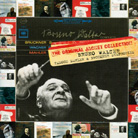 Mahler, Bruckner, Wagner
Mahler, Bruckner, Wagner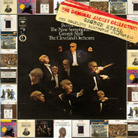 Beethoven Orchestral
Works
Beethoven Orchestral
Works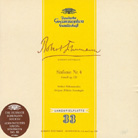 "Musik…Sprache
der Welt"
"Musik…Sprache
der Welt"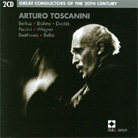 Great
Conductors of the 20th Century: Arturo Toscanini
Great
Conductors of the 20th Century: Arturo Toscanini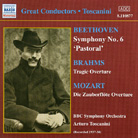 Toscanini
and the BBC Symphony Orchestra
Toscanini
and the BBC Symphony Orchestra Both Sony and Deutsche Grammophon
are offering valuable back-catalogue material with cover art from the original LP jackets
-- in Sony’s case the entire jackets, shrunk to fit the CDs. This is quite an
attractive marketing idea, and the recordings involved are for the most part well worth
preserving. At the same time, EMI has wound up its "Great Conductors of the 20th
Century" series with a set devoted to the most influential of that century’s
conductors, Arturo Toscanini, whose 68-year career ended 50 years ago.
Both Sony and Deutsche Grammophon
are offering valuable back-catalogue material with cover art from the original LP jackets
-- in Sony’s case the entire jackets, shrunk to fit the CDs. This is quite an
attractive marketing idea, and the recordings involved are for the most part well worth
preserving. At the same time, EMI has wound up its "Great Conductors of the 20th
Century" series with a set devoted to the most influential of that century’s
conductors, Arturo Toscanini, whose 68-year career ended 50 years ago.